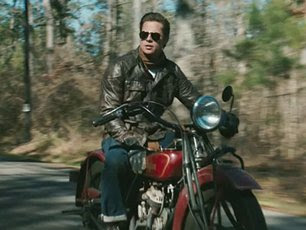Curious Benjamin Button

I remember reading Scott Fitzgerald's "The Curious Case of Benjamin Button" in high school; it probably made its mark because it was just so overtly whimsical. There was nothing in the short story that begged to be believed, and that was fine with me. It was an early awakening to surreal, semi-fantastic writing, and I liked it if only because it was very weird.
So what I don't get is why the movie begged so hard to be believable. Practically everything was changed, the story included. In the short story, Benjamin was born old and already talking. His mother did not die, and his father did not abandon him. The older Button was embarassed of course, so tried to hide his son as much as possible. Benjamin grew up, not in a retirement home, but in his very own home. He tried to enter Yale, but was kicked out because he claimed to be teener when he clearly looked 70. He became a great businessman, saw Hildegarde Montcrief and married her. They had one son - Roscoe. They did start having problems because obviously Benjamin was getting younger. His desires were also changing--- he found that he likes partying more than he did years before. As Benjamin grew younger, Roscoe grew older and started feeling nothing but contempt for his father. During Roscoe's wedding, his father was nothing but a 10-year-old kid. When his daughter was born, his father became her playmate.
Case in point, in the movie, Benjamin acted his chronological age. When he was seven but looking seventy, he acted like a seven year-old kid. When he was seventy and looked like a toddler, he had advanced dementia. In the book, when he was seven, he acted like he was seventy. When he was seventeen, he acted like a teenager. Just the fact that the movie reversed it, made so many impacts to the message of the film.
So I guess, you have to take the movie as a separate endeavor, and not even connect it to the story it was supposed to be based upon. That said, maybe now I can tell you that the film was gorgeous. It was visually satisfying, how can it not be? Period sets, and Brad Pitt getting younger every minute.... that ought to be enough. Effects were also pretty awesome. Pitt's transformation from eighty to eighteen was amazing. cate Blanchett is also luminiscent in the film. God, she's beautiful.
But the movie was sooooo long. I felt like I grew white hairs waiting for the whole thing to finish. It wasn't exactly boring... that isn't the word for it. It was tedious in the sense that you feel tired for the characters on screen. The story and feel of the whole thing was so somber you can't help but feel like you're getting wrinkled up inside as well. Of course the movie's main thesis is that we all age, and what's amusing is it's exactly how you feel while watching it. I was also continually distracted by the older Daisy lying in her hospital bed with her daughter reading Benjamin's diary. Her gurgling speech was incoherent and made me want to mutter, "get this scene done already."
The short story was crueler to Benjamin. He was ultimately unloved by the end of his life. In the movie, he dies as a young babe in the arms of Daisy. Kahit dito lang tayo mag-focus, ang laki na ng pinagkaiba ng message ng pelikula.
But if the two medium agrees agrees on anything, it's this: time is fleeting. make the most of it. Time in reverse makes you see how much more important the process of life is. How Time is our best friend and worst enemy.
So is it worth watching? Yes!
Is it worth watching twice? Thrice? Jeez, no. Unless you want to feel like a septugenarian at 27.


Comments
Post a Comment